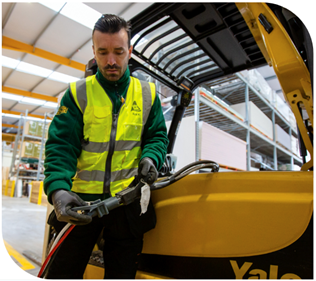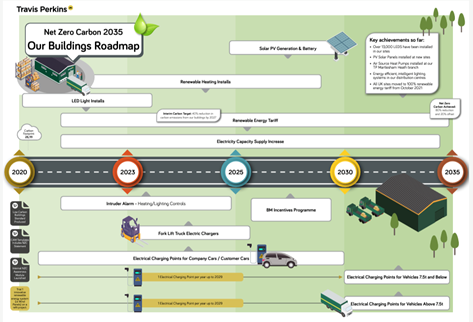Construction has a key role to play in decarbonising the built environment and Travis Perkins plc is committed to lead on this agenda.
The Group takes responsibility for direct environmental impacts from its estate of over 1,400 sites and fleet of 2,500 vehicles. The Group has committed to reducing Scope 1 and 2 carbon – relating to the Group’s fleet and estate – by 80% by 2035 and offset any remaining emissions. Whilst 99% of the Group’s footprint is in the supply chain, to have integrity in asking suppliers and customers to decarbonise the Group must address its own direct emissions. |  |
For information on the Group’s Scope 3 target and progress see the Modernising Construction page. During 2024, Scope 1&2 carbon reduced by 13%, taking performance from the 2020 baseline year to 2024 to -42%. The absolute reduction is partly influenced by volume-driven activity decline in a tough economic climate |
 |
Decarbonising the fleet In 2024 the Group completed one of the UK’s largest forklift electrification programmes. This multi-million pound investment enabled the transition of diesel powered forklift trucks to a fully electric alternative. The programme resulted in a root and branches review of mobile handling equipment needs, and saw the introduction of around 900 electric forklift trucks and associated charging infrastructure. The Group is already seeing improvement in operational efficiency and it is estimated that this programme will reduce Scope 1 emissions by around 5,000 tonnes CO2e per annum. The Group also continued to use HVO instead of diesel in 210 of its HGVs during the year. |
Decarbonising the estate The Group’s estate consists of a number of distribution centres and over 1,400 branches. The Group continues to use a renewable energy tariff, saving over 13,000 tCO2e emissions. Work continues on the rollout of the Group’s LED lighting project, replacing obsolete fluorescent lighting with modern, efficient, LED lighting and PIR sensors. Investment in this project, whilst not delivering additional carbon savings while the Group is on a renewable tariff, lowers the Group’s energy demand and delivers operational cost benefits. The Group has also taken action to decarbonise new branch openings, installing air source heat pumps, solar panels and electric vehicle charging stations. |









